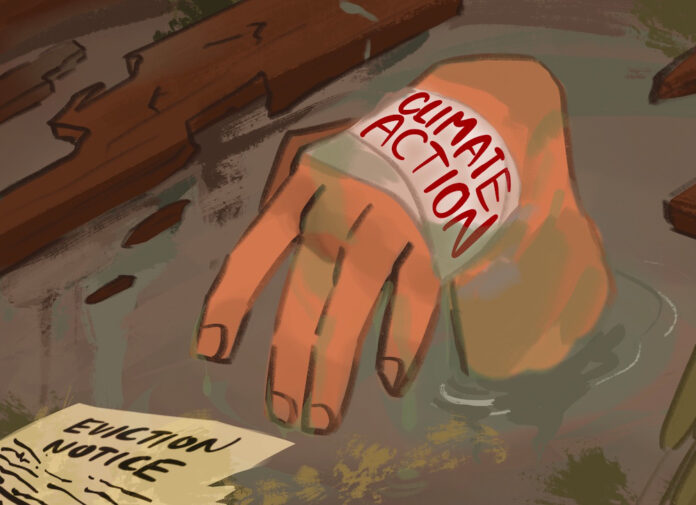I never expected my home city of Philadelphia to transform into a brackish-looking Venice — but that’s exactly what happened after Hurricane Ida hit the East Coast last week. The neighborhoods closest to the city’s main river, the Schuylkill, along with a large highway going through the city were submerged in brown water, creating an ominous dystopian look to the city.
My family, and all those living on the East Coast, are no strangers to hurricanes. In 2012, Hurricane Sandy battered the Atlantic Seaboard. My family living on the Jersey Shore had their house destroyed by mold and flooding when Long Beach Island was swallowed by the ocean.
Even if significant climate action is taken, global warming is driving more frequent and damaging natural disasters. Families living in areas vulnerable to these inevitable disasters are also frequently victims of poverty, racism and housing injustice. Lawmakers need to focus on creating equitable infrastructure to support the hardest-hit communities and cities, with a particular focus on affordable housing.
I am not at all minimizing the effects of climate change — as a seasoned climate activist, I fully support legislation and action that targets greenhouse gas emissions and contributes to climate justice. However, while these actions will be effective in the long run, there are so many people being affected right now and these policies won’t rebuild their homes. When policymakers focus primarily on climate change, they ignore the immediate needs of those who most frequently suffer from natural disasters.
In Philadelphia, the main areas impacted were small neighborhoods and the Vine Street Expressway, the main artery of the city. This significant damage prevented commuters from entering the city. New York and Louisiana were hit even harder, and suffered even more damage and loss of life. In New York, redlined neighborhoods were twice as likely to be severely flooded than those that were not. Additionally, as seen in Philadelphia, the increase in development and high amounts of concrete covering the ground limits the amount of floodwater that can be absorbed, which contributes to high flooding in neighborhoods with less green space. And, neighborhoods with less green space are typically those that were historically redlined and have a higher proportion of people of color and low-income families. In both cities, low-income residents are further affected by the end of the moratorium on evictions ruled by the Supreme Court.
In Louisiana, Hurricane Ida impacted people beyond those living in urban areas, such as New Orleans. Many rural communities that were severely damaged by Hurricane Ida were also destroyed by Hurricane Katrina in 2005. Both rural and urban communities are being affected by the end of the eviction moratorium, as well as the fact that Louisiana has distributed less than a quarter of its funds from the Emergency Rental Assistance Program.
Louisiana suffered the worst of the flooding in the United States, which is typical of the state, due to its location on the Gulf Coast. Families that were flooded in other hurricanes and remained in their homes are consistently in the path of danger, both for their lives and their financial stability. Despite improvements to Louisiana’s flood protection system, some regions will still be damaged when the next hurricane season rolls around. The residents in these communities should be equitably relocated, not just given a few levees and dams to hold off the floodwaters.
So, what has been done to soften the impact felt by these communities? There has been some action on the federal level — although most of this action has little involvement with the housing crisis specifically. First, the Senate passed a bipartisan infrastructure bill supported by President Biden, with goals to relocate hardest hit communities and increase coastal defenses for flooding which can benefit both Mid-Atlantic cities and Southern communities. Another bill, which could aid the low-income communities who are more likely to be hit by the worst flooding, has less support from Republicans. It includes provisions for child care, paid family leave, money for public housing, community land trusts and a tax cut for families making less than $400,000 a year, among other things. This bill has passed the House, but there is a lot of opposition in the Senate, including some from centrist Democrats.
We cannot fight the climate crisis without considering the needs of low-income families and people of color. These people are here and they need help, right now. Support mutual aid groups doing the groundwork if you can, but ultimately, we need both urban and rural policy change at the national level. Call your representatives, stay informed and participate by using your right to vote every year. We need to take all the action we can in order to achieve housing justice for those affected by the climate crisis.
![]()































